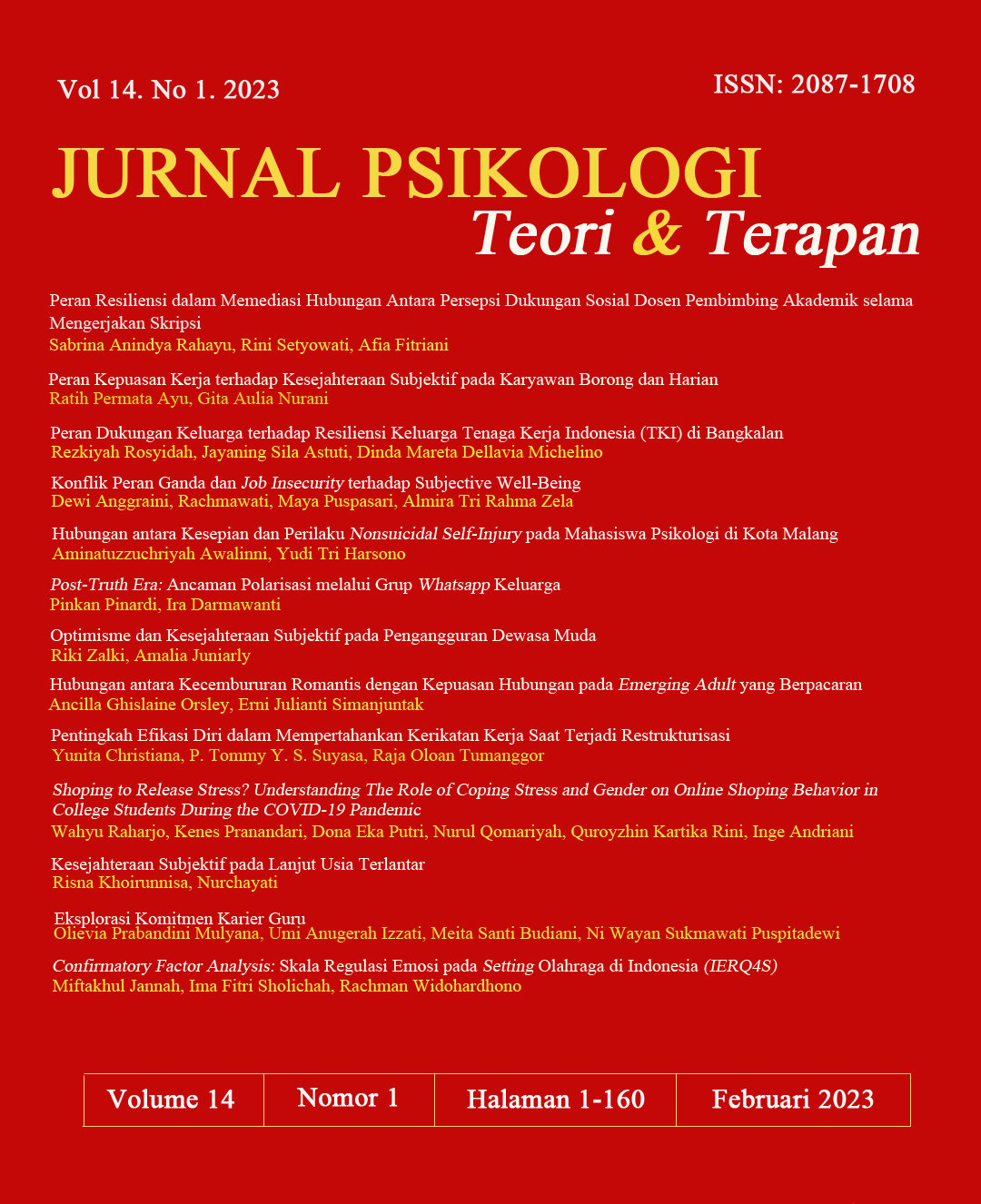Confirmatory Factor Analysis: Skala Regulasi Emosi Pada Setting Olahraga di Indonesia (IERQ4S)
DOI:
https://doi.org/10.26740/jptt.v14n1.p153-160Keywords:
regulasi emosi, confirmatory factor analysis, IERQ4S, ERQAbstract
Penelitian terdahulu menunjukkan adanya peningkatan minat dalam mempelajari regulasi emosi dalam olahraga. Emotion Regulation Questionnaire (ERQ) merupakan skala dengan 10 item yang digunakan untuk mengukur dua proses untuk menilai strategi regulasi emosi individu yang terkait dengan reappraisal dan suppression. Penelitian ini dilakukan untuk menguji struktur faktor ERQ versi Bahasa Indonesia untuk setting olahraga yang disebut IERQ4S dalam sampel 1.145 atlet dengan rentang usia 18-40 tahun. Penelitian ini melibatkan penerjemah terdiri dari 2 orang dan 3 orang expert judgment. IERQ4S sebelum digunakan diberikan kepada 5 atlet untuk mengetahui pemahaman subjek. Analisis penelitian ini menggunakan prosedur statistik Confirmatory Factor Analyses (CFA). Hasil penelitian menunjukkan nilai loadings factor skala IERQ4S lebih besar dari 0.50. Hal ini mendukung struktur IERQ4S terbukti valid dan menunjukkan model konstruk instrumen dengan kriteria yang baik. Hasil analisis reliabilitas IERQ4S menunjukkan nilai di atas .060 sehingga dapat dikatakan reliabel. IERQ4S yang telah dirancang terbukti menjadi alat ukur yang konsisten secara struktural sehingga dapat digunakan untuk instrumen pengumpul data pada atlet.
References
Anuar, N., Cumming, J., & Williams, S. (2016). Emotion regulation predicts imagery ability. Journal Indexing & Metrics, 35 (3). 254-269.
Azwar, S. (2011). Reliabilitas Dan Validitas. Yogyakarta: Pustaka Pelajar.
Black, W. C., Babin, B. J., & Anderson, E.R. (2014). Multivariate Data Analysis (7th ed.). Harlow: Pearson Education Limited.
Costa-Lobo, C., Martins, P., & Campina, A. (2017). Subjective well-being, emotional regulation and motivational guidance in high sport competition. Polytechnic Institute of Porto.
Gratz, D. T & Roemer, J.J. (2004). Antecedent and response-focused emotion regulation: Divergent consequences for experience, expression, and physiology. Journal of Personality and Social Psychology, 74, 224-237
Gross, J.J (Ed.). (2007). Handbook of Emotion Regulation. New York: Guilford
Jones, M. V. (2012). Emotion regulation and performance. In S. M. Murphy (Ed.), Oxford library of psychology. The Oxford handbook of sport and performance psychology. New York: Oxford University Press.
Lobo, C.C., Cordeiro, S.A., Martins, P., & Campina, A. (2017). Subjective well-being, emotional regulation and motivational guidance in high sport competition. Proceedings of 3rd International Conference on Lifelong Education and Leadership for All, 134-143.
Mohebi, M., Zarei, S., & Sohbatiha, M. (2017). The Relationship between Emotion Regulation Strategies and Mental Toughness in Elite Taekwondo Athletes. Journal of Sport Psychology Studies, 21, 29-42. https://doi.org/10.22089/SPSYJ.2017.2830.1294
Molina, V.M & Granado, X.O & Mendoza, M.C. (2018). Emotional regulation and physical recovery in young athletes of individual and collective sport modalities. RICYDE. Revista internacional de ciencias del deporte, 14. 191-204.
Robazza, C., & Ruiz, M.C. (2018). Emotional self-regulation in sport and performance. physiology. Journal of Personality and Social Psychology, 74, 224-237.
Downloads
Published
How to Cite
Issue
Section
License

This work is licensed under a Creative Commons Attribution-NonCommercial 4.0 International License.
Authors who publish in this journal agree to the following terms:
Copyright in any article is held by the author.
The author grants the journal, publication rights with the work simultaneously licensed under a Creative Commons Attribution License that allows others to share the work with an acknowledgment of the work's authorship and initial publication in this journal.
Authors may enter into separate, additional contractual arrangements for the non-exclusive distribution of the journal's published version of the work (e.g., posting it to an institutional repository or publishing it in a book), with an acknowledgment of its initial publication in this journal.
Authors are permitted and encouraged to post their work online (e.g., in an institutional repository or on their website) prior to and during the submission process, as this can lead to productive exchanges, as well as earlier and greater citation of published work.
 Abstract views: 7897
,
Abstract views: 7897
, PDF Downloads: 6171
PDF Downloads: 6171


















